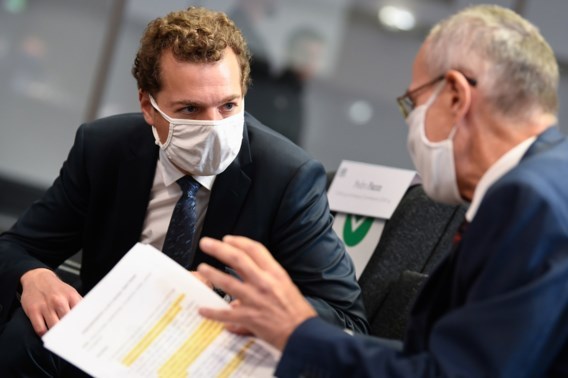Belgium now has a coronavirus commissioner, eight months into the crisis and several months after the idea was first suggested.
Pedro Facon is 39 years old, and is director-general of the federal public health ministry. Announcing the appointment, prime minister Alexander De Croo praised Facon’s handling of the first wave of the epidemic in Belgium. “He helped ensure that the hospitals were not overwhelmed,” De Croo said.
The creation of a corona commission with one official at the top is intended to bring together Belgium’s splintered policy machinery, with its multiplicity of health responsibilities. From now on, all policies, whether federal, regional, provincial (as in the case of the Antwerp curfew) or even municipal, will first pass through the hands of Facon, in the hope that anyone travelling from Ostend to Eupen might be subject to the same rules and regulations from one end of the journey to the other.
Facon will be supported by his deputy, Dr Carole Schirvel, an epidemiologist and specialist in hospital hygiene, making up a team of functionary plus specialist at the top. They will be supported by a multidisciplinary scientific committee.
One of Facon’s first jobs will be to get the long-awaited corona-barometer up and running.
Related News
- Belgium will appoint first 'corona commissioner' today
- Belgium tightens measures: bubbles shrink, bars close early
The barometer is based on the reporting by GPs of the incidence of patients coming in with respiratory complaints – an indicator that closely follows the incidence of Covid-19, although not all respiratory complaints are caused by the coronavirus.
Those reports, for which family doctors are compensated, will allow a highly granular view of where the likely hotspots of the virus are in the country, and where testing should be intensified.
But the barometer is struggling to get out of the starting blocks, even as the numbers of new cases, hospital admissions and deaths continue to rise.
Facon started his career with the federal medical insurance authority Riziv/Inami, and was brought into the cabinet of former health minister Maggie De Block in 2014 as head of health care. In 2017, at the age of only 36, he was bumped up to become director-general of the administration.
His baptism by fire came in the spring of this year, when the coronavirus travelled from Wuhan in China and arrived in Belgium, and shortly after turned into a worldwide pandemic.
Facon impressed everyone involved by his creation of a hospital plan which aimed to prevent hospitals from being overwhelmed. As he described in an interview with De Standaard in June, the gravity of the situation hit home with him when he saw the images coming out of Italy of agonising patients lined up in hospital corridors.
“They have had the brutal bad luck to be the first site of the explosion here in Europe. That could just as well have been Belgium. From then on I entered the arena and the race against time started for us.”
His reaction was to call in Erika Vlieghe, an infectious diseases expert who went on to head the expert group charged with exiting the country from lockdown. Together they worked out the plan which in the end meant that Belgium’s hospitals never faced a lack of capacity, in intensive care as in the wards.
“I think a lot of people don’t realize how lucky we were that Italy went before us,” he said in June in a conversation with De Tijd. “We gained ten to fourteen days of time as a result.”
Since then, he had been a member of Celeval, the cell for evaluation of the situation, made up of scientists and political representatives.
The commission he now heads will effectively replace the various alternatives. Whether he can square the circle and work with and for all sides remains to be seen. He is in office for one year, renewable for six months at a time thereafter.
Alan Hope
The Brussels Times

